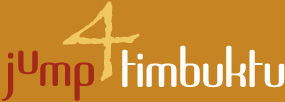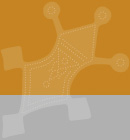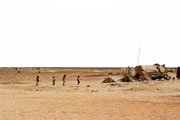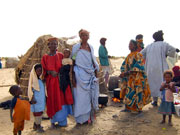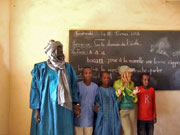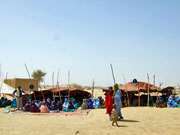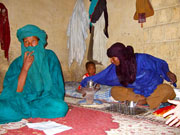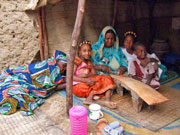Tuareg Relief Vision for sustainable development in Timbuktu
Tuareg communities in and around Timbuktu live securely with sustainable livelihoods and community facilities essential to human dignity and well being.
Our visit to Timbuktu in February 2008 inspired us to establish Tuareg Relief (charity Nº 1127167), our registered UK charity, and its ethical trading arm, Jump4Timbuktu (Company Nº 06585731). We work in partnership with Artisan Associations and Tuareg tribal leaders to discuss and agree together ways forward for achieving our common vision.
Read below for more...
Charity fundraising and project management
Tuareg Relief is committed to raising the necessary funds for sustainable development projects agreed with our Tuareg partners in Timbuktu. We have established a strategic coordination group in Timbuktu to advise on sustainable development projects for investment and to ensure projects are well designed and implemented. The group consists of Tuareg Artisan leaders, the Mayor of Timbuktu, the local NGO coordinator, and Tuareg Relief/Jump4Timbuktu.
Once funds are in place, projects will be managed on the ground in Timbuktu by ourselves in association with the coordination group together with regular monitoring and evaluation. Feedback reports will be available to funding agencies, donors and sponsors; updates will be published on this website.
Our vision is to ensure projects are sustainable in the medium term through contributions from the Tuareg communities and from the trading profits made by Jump4Timbuktu . All such profits, after trading costs, are transferred to Tuareg Relief for this purpose. Jump4Timbuktu and Tuareg Relief are organised by unpaid directors and volunteers. Click here for information on who is involved.
Challenges to survival
The past century saw profound changes to the Tuareg way of life, with political marginalisation following the end of French colonial rule and the creation of new countries and boundaries. The droughts of the early 1970s were devastating: numerous lives were lost and herds of livestock decimated. As a direct result Tuareg women were forced to sell their heritage of jewellery to feed their families. Climate change has exacerbated their difficulties and, together with the droughts, has impacted on their social and economic organisation. After 1973 many Tuaregs could no longer sustain their nomadic lifestyle and settled in isolated village communities. Additionally, artisans from these communities have moved into Timbuktu in order to trade and earn a living. With their families they now number some 10,000. Although based in Timbuktu, their connection to their villages is fully intact, and they represent a vital source of income.
As part of our return visit to Timbuktu in 2009, we stayed in a village connected to one of the Silversmith Associations. We met with the tribal elders to discuss our connection with the artisans within their community. It was apparent that the fair trade activity of Jump4Timbuktu is essential to the economic security and sustainable development of the village. Furthermore, they made clear the need to develop sustainable services within the community such as access to clean water and educational and medical support. They recognised that access to water creates the opportunity to grow crops for animals and food for themselves; that access to schools ensures they can develop new knowledge and skills to enable them to do this. There are no government funds for such provision in these outlying villages.
Click here to return to the top of the Tuareg Relief Vision for sustainable development in Timbuktu page.
